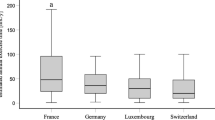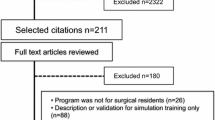Abstract
Background
Dedicated practice using laparoscopic simulators improves operative performance. Yet, voluntary utilization is minimal. We hypothesized that skill competition between peers, at the local and national level, positively influences residents’ use of laparoscopic simulators.
Methods
A web-based survey evaluated the relationship between Canadian General Surgery residents’ use of laparoscopic simulation and participation in competition. Secondary outcomes assessed attitudes regarding simulation training, factors limiting use, and associations between competition level and usage.
Results
One hundred ninety (23%) of 826 potential participants responded. Eighty-three percent rated their laparoscopic abilities as novice or intermediate. More than 70% agreed that use of simulation practice improves intra-operative performance, and should be a mandatory component of training. However, 58% employed simulator practice less than once per month, and 18% never used a simulator. Sixty-five percent engaged in simulator training for 5 h or less over the preceding 6 months. Seventy-three percent had participated in laparoscopic skill competition. Of those, 51% agreed that competition was a motivation for simulation practice. No association was found between those with competition experience and simulator use. However, 83% of those who had competed nationally reported >5 h of simulator use in the previous 6 months compared to those with no competition experience (26%), local competition (40%), and local national-qualifying competition (23%) (p < 0.001).
Conclusions
This study does not support the hypothesis that competition alone universally increases voluntary use of simulation-based training, with only the minority of individuals competing at the national level demonstrated significantly higher simulation use. However, simulation training was perceived as a valuable exercise. Lack of time and access to simulators, as opposed to lack of interest, were the most commonly reported to limited use.



Similar content being viewed by others
References
Perkins N, Starkes JL, Lee TD, Hutchison C (2002) Learning to use minimal access surgical instruments and 2-dimensional remote visual feedback: how difficult is the task for novices? Adv Health Sci Educ 7:117–131. doi:10.1023/A:1015700526954
Gallagher AG, McClure N, McGuigan J, Ritchie K, Sheehy NP (1998) An ergonomic analysis of the fulcrum effect in the acquisition of endoscopic skills. Endoscopy 30:617–620. doi:10.1055/s-2007-1001366
Buckley CE, Nugent E, Ryan D, Neary PC (2012) Virtual reality—a new era in surgical training. Virtual Real Psychol Med Pedagog Appl. doi:10.5772/46415
Bholat OS, Haluck RS, Murray WB, Gorman PJ, Krummel TM (1999) Tactile feedback is present during minimally invasive surgery. J Am Coll Surg 189:349–355. doi:10.1016/S1072-7515(99)00184-2
Derossis AM, Bothwell J, Sigman HH, Fried GM (1998) The effect of practice on performance in a laparoscopic simulator. Surg Endosc 12:1117–1120
Rosser JC, Rosser LE, Savalgi RS (1998) Objective evaluation of a laparoscopic surgical skill program for residents and senior surgeons. Arch Surg 133:657–661. doi:10.1001/archsurg.133.8.911-b
Hyltander A, Liljegren E, Rhodin PH, Lönroth H (2002) The transfer of basic skills learned in a laparoscopic simulator to the operating room. Surg Endosc 16:1324–1328. doi:10.1007/s00464-001-9184-5
Korndorffer JR, Dunne JB, Sierra R, Stefanidis D, Touchard CL, Scott DJ (2005) Simulator training for laparoscopic suturing using performance goals translates to the operating room. J Am Coll Surg 201:23–29. doi:10.1016/j.jamcollsurg.2005.02.021
Scott DJ, Bergen PC, Rege RV, Laycock R, Tesfay ST, Valentine RJ, Euhus DM, Jeyarajah DR, Thompson WM, Jones DB (2000) Laparoscopic training on bench models: better and more cost effective than operating room experience? J Am Coll Surg 191:272–283
Van Sickle KR, Ritter EM, Baghai M, Goldenberg AE, Huang I-P, Gallagher AG, Smith CD (2008) Prospective, randomized, double-blind trial of curriculum-based training for intracorporeal suturing and knot tying. J Am Coll Surg 207:560–568. doi:10.1016/j.jamcollsurg.2008.05.007
Seymour NE, Gallagher AG, Roman SA, O’Brien MK, Bansal VK, Andersen DK, Satava RM (2002) Virtual reality training improves operating room performance: results of a randomized, double-blinded study. Ann Surg 236:458–463. doi:10.1097/01.SLA.0000028969.51489.B4
Chang L, Petros J, Hess DT, Rotondi C, Babineau TJ (2007) Integrating simulation into a surgical residency program: is voluntary participation effective? Surg Endosc 21:418–421. doi:10.1007/s00464-006-9051-5
Ericsson KA, Krampe RT, Tesch-Römer C (1993) The role of deliberate practice in the acquisition of expert performance. Psychol Rev 100:363–406. doi:10.1037/0033-295X.100.3.363
Chambliss DF (1989) The mundanity of excellence: an ethnographic report on stratification and olympic swimmers. Sociol Theory 7:70–86
El-Beheiry M, McCreery G, Schlachta CM (2016) A serious game skills competition increases voluntary usage and proficiency of a virtual reality laparoscopic simulator during first-year surgical residents’ simulation curriculum. Surg Endosc Other Interv Tech. doi:10.1007/s00464-016-5152-y
Author information
Authors and Affiliations
Corresponding author
Ethics declarations
Disclosures
Drs. Greig L. McCreery, Mostafa El-Beheiry, and Christopher M. Schlachta have no conflicts of interest or financial ties to disclose.
Rights and permissions
About this article
Cite this article
McCreery, G.L., El-Beheiry, M. & Schlachta, C.M. Local and national laparoscopic skill competitions: residents’ opinions and impact on adoption of simulation-based training. Surg Endosc 31, 4711–4716 (2017). https://doi.org/10.1007/s00464-017-5546-5
Received:
Accepted:
Published:
Issue Date:
DOI: https://doi.org/10.1007/s00464-017-5546-5




